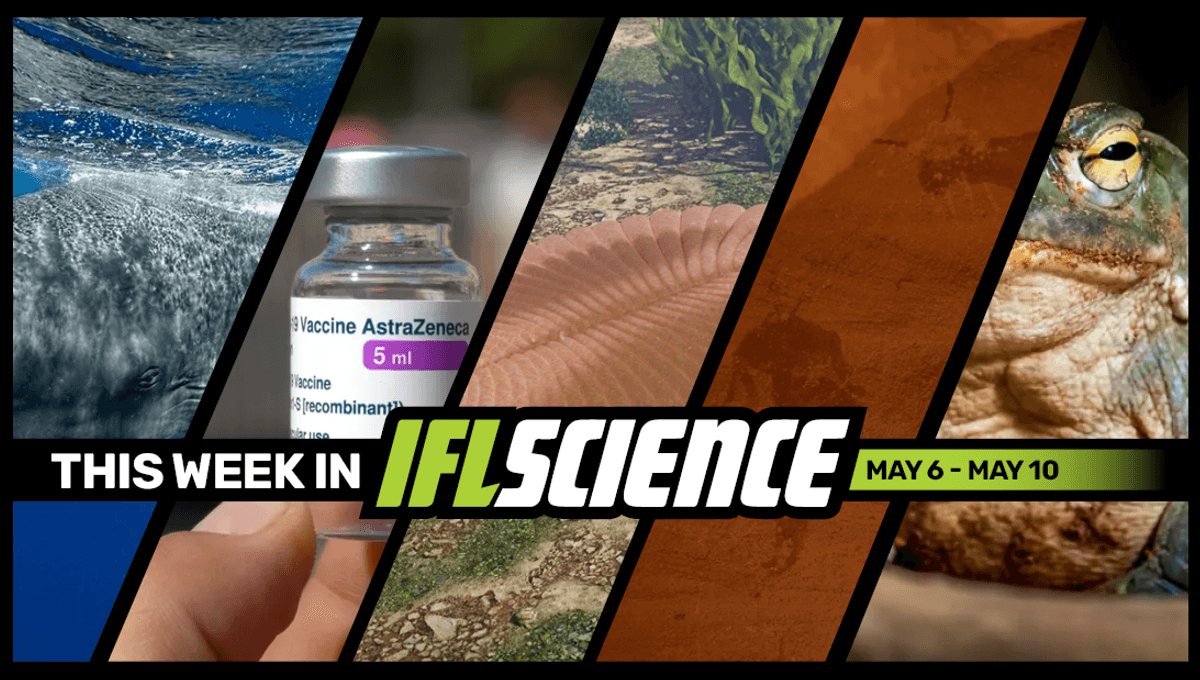
This week, the “near-collapse” of Earth’s magnetic field 590 million years ago may have helped complex life form, rock art depicting cows suggests the Sahara was a very different place 4,000 years ago, and could psychedelic toad venom be the next big thing in antidepressants? Finally, we consider the dinosauroid and explore how dinosaurs may have evolved if Chicxulub had never hit Earth.
Subscribe to the IFLScience newsletter for all the biggest science news delivered straight to your inbox every Wednesday and Saturday.
Sperm Whale “Phonetic Alphabet” Surprisingly Similar In Structure To Human Language
Cetaceans have long been famous for their communication abilities, from the impressive clicks and whistles of dolphins to the magical sound of humpback whale song. Sperm whales have been known to communicate too, and new research has made a big leap forward in understanding the structure of their vocalizations. Read the full story here
Why Has AstraZeneca Taken Its COVID-19 Vaccine Off The Market? Here’s What To Know
Nearly 3.5 years after it received its first approval for use, the Oxford-AstraZeneca COVID-19 vaccine is set to be withdrawn worldwide. It’s a headline that’ll certainly be an attention-grabber – the vaccine has gained a bit of a reputation in its time, after all – but what’s the reason behind it being discontinued? It’s not as scandalous as some might suggest. Read the full story here
Earth’s Magnetic Field’s “Near-Collapse” 590 Million Years Ago May Have Helped Complex Life
The Earth’s magnetic field has changed direction many times over millions of years, sometimes accompanied by temporary weakening. A much longer period in which the field diminished took place between 591 and 565 million years ago. Shortly after, the first fossils of complex animals appear in the geologic record. A new study suggests it might be that weakening that made this possible, despite the apparent contradiction with the field’s role in making life possible. Read the full story here
Newly Discovered Rock Art Shows The Sahara Was A Radically Different Place 4,000 Years Ago
Written on the walls of sites in the Atbai Desert in Eastern Sudan, prehistoric rock art tells the story of a very distant past. While the region today is achingly arid, the artwork implies it was once a lush, green land filled with water, pastures, and animal life. Read the full story here
Could This Toad’s Psychedelic Venom Be The Next Big Thing In Antidepressants?
Behold the Colorado River toad. Also known as the Sonoran Desert toad, these bulbous fellas pack a psychedelic punch just below the surface. Their venom, which they can secrete through glands on their skin, contains a hallucinogenic compound, which the scientists behind a new study say could be a potent antidepressant. Read the full story here
TWIS is published weekly on our Linkedin page, join us there for even more content.
Feature of the week:
If Dinosaurs Weren’t Extinct, Would The Dinosauroid Walk Among Us?
The dinosauroid is a hypothetical animal that’s been suggested as a possible next step for a group of carnivorous dinosaurs. Imagine a world in which Chicxulub hadn’t put an end to The Age Of Dinosaurs: would mammals have risen? Would humans exist? Or would the dinosauroids rule the day? Read the full story here
More content:
CURIOUS Live, our free virtual event, is back for May 2024. Register now and join us as we explore nuclear war, the connection between mental and physical health, insect detectives, and the search for life elsewhere in the universe. Grab your free ticket now!
Have you seen our e-magazine, CURIOUS? Issue 22 May 2024 is out now. Check it out for exclusive interviews, book excerpts, long reads, and more.
PLUS, the entire season 3 of IFLScience’s The Big Questions Podcast is available now.
Source Link: Sperm Whale “Phonetic Alphabet” Similar To Human Language, Why AstraZeneca Has Taken Its COVID-19 Vaccine Off The Market, And Much More This Week